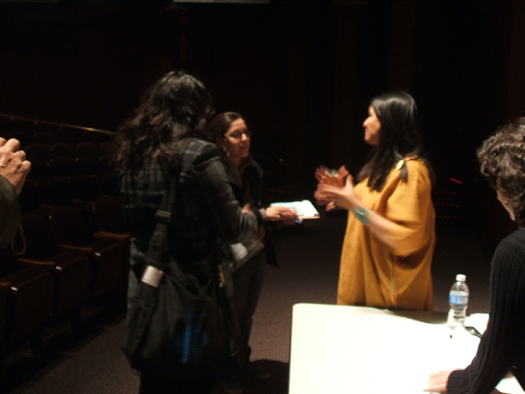| « Police Computers Were All Down For 24 Hours. Newsworthy? Apparently Not | UIC Group to Protest Pilsen Clinic Closing » |
Chicago Tue Apr 21 2009
Cisneros Revisits Chicago, Listens to el Corazón
 Anyone who's unsure of how politics and literature/art relate to one another effectively should consider reading Sandra Cisneros's The House on Mango Street, which is this spring's One Book, One Chicago choice.
Anyone who's unsure of how politics and literature/art relate to one another effectively should consider reading Sandra Cisneros's The House on Mango Street, which is this spring's One Book, One Chicago choice.
The book follows the life of Esperanza, a young Mexican-American girl growing up in Humboldt Park, through tiny vignettes about the little things in her life that add up to a whole lot more -- hair, her age, her name, school lunches, hips.
As she matures, Esperanza witnesses the lingering effects of gangs, binding domesticity and poverty in her community and among her friends. She vows to get ahead with education and to leave Mango Street, but "to come back. For the ones I left behind. For the ones who cannot out." Though Cisneros, a Chicago native, has a deceptively simple writing style, she gives a complex human face to the struggles of working-class families everywhere in Chicago, especially Latino families. Many of the stories, Cisneros has said, were influenced from her days teaching at Latino Youth High School.
The book is taught in several high schools and celebrated its 25th anniversary this year. In the anniversary edition, Cisneros talks about her objective as a writer, explaining, in third person:
She wants to write stories that ignore borders between genres, between written and spoken, between highbrow literature and children's nursery rhymes, between New York and the imaginary village of Macondo, between the U.S. and Mexico. It's true, she wants the writers she admires to respect her work, but she also wants people who don't usually read books to enjoy these stories too. She doesn't want to write a book that a reader won't understand and would feel ashamed for not understanding. She thinks stories are about beauty. Beauty that is there to be admired by anyone, like a herd of clouds grazing overhead. She thinks people who are busy working for a living deserve beautiful little stories, because they don't have much time and are often tired. She has in mind a book that can be opened at any page and will still make sense to the reader who doesn't know what came before or what comes after.
Cisneros lives in San Antonio now but was back in town last week to discuss her career at the Harold Washington Library. Nearly 500 people came out to see her speak, and she signed books and graciously posed for pictures for nearly two hours. When an audience member asked her about her hopes as a writer, she compared writing to a much-needed nutritious meal:
I really hope that my writing changes people and nourishes them. I think that there's a lot of fast food art out there that is just kind of like fluffer-nutter, like marshmallow topping. I don't have time for that kind of diet. I really want literature that's going to change my life so that I can be wiser, so I can be nourished, so I can go on living, so I can have hope, so I can be a better person than I am now. And if it doesn't do that for me, I just don't have the time. So I'm looking for stories that will do that to me. And I hope the writing I write will feed the community I love. I try to write it so it will feed and nourish and help them to grow spiritually. I really do hope that. And I want my writing to change people -- that they take the story home with them and they remember it.
This evening at 6 p.m., Juan Mora-Torres, an associate professor in History at DePaul, leads a discussion titled "Mango Street Revisited -- Youth, the Community/Barrio, and Immigration in Mexican Chicago." On April 29, another DePaul panel follows, titled "Uprooted and Unprotected: Voices of Longing in Sandra Cisneros' The House on Mango Street."











